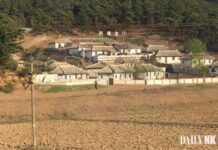Homeless children in North Korea who often beg for food,
known as kkotjebi, are becoming increasingly involved in theft or robberies,
frequently organizing into groups of five or six to steal goods and sell them
to vendors on the black market, Daily NK has learned.
“The kkotjebi we see recently at the marketplace or in
front of train stations are different from those who used to beg for food and
live day to day–they are much bolder now,” a source in South Pyongan Province told
Daily NK on Thursday. “Unlike in the past, when they used to wander around
alone, these days they work in small groups to look for opportunities to make
money and find channels to sell things.”
He added, “Five to six street-smart, agile teenagers discuss
plans and methods every day on how to make money, which gets split up among them. They mainly steal car parts or even hop on to trucks that are
transporting goods so they can steal them.”
While most of the kkotjebi work at night, some are brazen
enough to operate in broad daylight if the circumstances are apt; if a modern
20-ton semi trailer truck is chugging uphill, for example, the source said the
kkotjebi take advantage of the slowed momentum, hopping on or running alongside
the vehicle to lift off the battery covers. “These covers are sold to dealers
for about 15 USD, and then they get sold on the black market for about 20 USD,”
he said.
There are a number of reasons North Korean children end up
part of the kkotjebi; some run away from state-run facilities for abandoned or orphaned
children. Others, however, have parents who, mired in financial struggles,
cannot properly care for them, compelling the children to steal at night
after attending school during the day to help the family get by, according to
the source.
Some of these parents are so beset by such financial
hardships that they actually take whatever goods stolen by their children to
sell back on the market. Securing even minimal funds to run a simple operation
at the markets forces parents in these situations to turn a blind eye to their
children’s thefts.
“Watching some of these teenagers jump onboard operating
trucks and stealing car parts, people have been shaking their heads saying
kkotjebi are almost like special armed forces these days or 21st century North Korean partisan fighters,” he noted.
The source said that most residents are sympathetic to the situation, commenting that the fault lies not with the kkotjebi, “who
aren’t stealing because they want to,” but rather with the state, describing the hapless children as “byproducts of
life under Kim Jong Eun.” He added that worries invariably follow this compassion, asserting that residents “fear that without institutional
changes, North Korea will morph into a twisted mob-driven socialist society.”


















